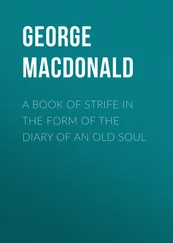George MacDonald - There & Back
Здесь есть возможность читать онлайн «George MacDonald - There & Back» — ознакомительный отрывок электронной книги совершенно бесплатно, а после прочтения отрывка купить полную версию. В некоторых случаях можно слушать аудио, скачать через торрент в формате fb2 и присутствует краткое содержание. Жанр: foreign_prose, foreign_religion, foreign_antique, на английском языке. Описание произведения, (предисловие) а так же отзывы посетителей доступны на портале библиотеки ЛибКат.
- Название:There & Back
- Автор:
- Жанр:
- Год:неизвестен
- ISBN:нет данных
- Рейтинг книги:4 / 5. Голосов: 1
-
Избранное:Добавить в избранное
- Отзывы:
-
Ваша оценка:
- 80
- 1
- 2
- 3
- 4
- 5
There & Back: краткое содержание, описание и аннотация
Предлагаем к чтению аннотацию, описание, краткое содержание или предисловие (зависит от того, что написал сам автор книги «There & Back»). Если вы не нашли необходимую информацию о книге — напишите в комментариях, мы постараемся отыскать её.
There & Back — читать онлайн ознакомительный отрывок
Ниже представлен текст книги, разбитый по страницам. Система сохранения места последней прочитанной страницы, позволяет с удобством читать онлайн бесплатно книгу «There & Back», без необходимости каждый раз заново искать на чём Вы остановились. Поставьте закладку, и сможете в любой момент перейти на страницу, на которой закончили чтение.
Интервал:
Закладка:
His father came to regard with wonder and admiration the redeeming faculty of his son, whereby he would reinstate in strength and ripe dignity a volume which he would have taken to pieces, and redressed like an age-worn woman in a fashionable gown. So far did his son’s superior taste work upon his, that at length, if he opened a new binding, however sombre, and saw a time-browned paper and old type within, the sight would give him the shock of a discord.
But Tuke was in many things no other than a man of this world, and sorely he doubted if such labour would ever have its counterpoise in money. It paid better, because it was much easier, to reclothe than to restore! to destroy and replace than to renew! When he had watched many times for minutes together his son’s delicate manipulation—in which he patched without pauperizing, and subaided without humiliating—and at last contemplating the finished result, he concluded him possessed of a quite original faculty for book-healing.—“But alas,” he thought, “genius seldom gets beyond board-wages!” It did not occur to him that genius least requires more than board-wages. He encouraged him, nevertheless, though mildly, in the pursuit of this neglected branch of the binding-art.
As the days went on, and their love for their nephew grew with his deserts, the uncle and aunt shrank more and more from the thought, which every year compelled them to think the oftener, that the day was drawing nigh when they must volunteer the confession that he was not their child.
When he was about seventeen, Richard settled down to work with his father, occasionally assisting him, but in general occupied with his own special branch, in which Tuke, through his long connection with book-lovers possessing small cherished libraries, was able to bring him almost as many jobs as he could undertake. The fact that a volume could be so repaired, stimulated the purchase of shabby books; and part of what was saved on the price of a good copy was laid out on the amendment of the poor one. But however much the youth delighted in it, he could not but find the work fidgety and tiring; whence ensued the advantage that he left it the oftener for a ramble, or a solitary hour on the river. He had but few companions, his guardians, wisely or not, being more fastidious about his associates than if he had been their very son. His uncle, of strong socialistic opinions, and wont to dilate on human equality—as if the thing that ought to be, and must one day come, could be furthered by the assertion of its present existence—was, like the holders of even higher theories, not a little apt to forget the practice necessarily involved: this son of a baronet, seeing that he was the son also of his wife’s sister, was not to be brought up like one of the many!
Ugliness in infancy is a promise, though perhaps a doubtful one, of beauty in manhood; and in Richard’s case the promise was fulfilled: hardly a hint was left of the baby-face which had repelled his father. He was now a handsome well-grown youth, with dark-brown hair, dark-green eyes, broad shoulders, and a little stoop which made his aunt uneasy: she would have had him join a volunteer corps, but he declared he had not the time. He accepted her encouragement, however, to forsake his work as often as he felt inclined. He had good health; what was better, a good temper; and what was better still, a willing heart toward his neighbour. A certain over-hanging of his brows was—especially when he contracted them, as, in perplexity or endeavour, he not infrequently did—called a scowl by such as did not love him; but it was of shallow insignificance, and probably the trick of some ancestor.
Before long, his thinking began to take form in verse-making. It matters little to my narrative whether he produced anything of original value or not; utterance aids growth, which is the prime necessity of human as of all other life. Not seldom, bent over his work, he would be evolving some musical fashion of words—with no relaxation, however, of the sharp attention and delicate handling required by the nature of that work. It is the privilege of some kinds of labour, that they are compatible with thoughts of higher things. At the book-keeper’s desk, the clerk must think of nothing but his work; he is chained to it as the galley-slave to his oar; the shoemaker may be poet or mystic, or both; the ploughman may turn a good furrow and a good verse together; Richard could at once use hands and thoughts. It troubled his protectors that they could not send him to college, but they comforted themselves that it would not be too late when he returned to his natural position in society. They had no plan in their minds, no date settled at which to initiate his restoration. All they had determined was, that he must at least be a grown man, capable of looking after his own affairs, when the first step for it was taken.
John Tuke was one of those who acknowledge in some measure the claims of their neighbour, but assert ignorance of any one who must be worshipped. And in truth, the God presented to him by his teachers was one with little claim on human devotion. The religious system brought to bear on his youth had operated but feebly on his conscience, and not at all on his affections. It had, however, so wrought upon his apprehensions, that, when afterward persuaded there was no ground for agonizing anticipation, he welcomed the conviction as in itself a redemption for all men; “for, surely,” he argued, “fear is the worst of evils!” The very approach of such a relief predisposed him to receive whatever teaching might follow from the same source; and soon he believed himself satisfied that the notion of religion—of duty toward an unseen maker—was but an old-wives’-fable; and that, as to the hereafter, a mere cessation of consciousness was the only reasonable expectation. The testimony of his senses, although negative, he accepted as stronger on that side than any amount of what could, he said, be but the purest assertion on the other. Why should he heed an old book? why one more than another? The world was around him: some things he must believe; other things no man could! One thing was clear: every man was bound to give his neighbour fair-play! He would press nothing upon Richard as to God or no God! he would not be dogmatic! he only wanted to make a man of him! And was he not so far successful? argued John. Was not Richard growing up a diligent, honest fellow, loving books, and leading a good life; whereas, had he been left to his father, he could not have escaped being arrogant and unjust, despising the poor of his own flesh, and caring only to please himself! In the midst of such superior causes of satisfaction, it also pleased Tuke to reflect that the trade he had taught his nephew was a clean one, which, while it rendered him superior to any shrewd trick fortune might play him, would not make his hands unlike those of a gentleman.
His aunt, however, kept wishing that Richard were better “set up,” and looked more like his grandfather the blacksmith, whose trade she could not help regarding as manlier than that of her husband. Hence she had long cherished the desire that he should spend some time with her father. But John would not hear of it. He would get working at the forge, he said, and ruin his hands for the delicate art in which he was now unapproachable.
For in certain less socialistic moods, John would insist on regarding bookbinding, in all and any of its branches, not as a trade, but an art.
CHAPTER V. THE MANSONS
At school, Richard had been friendly with a boy of gentle nature, not many years older than himself. The boy had stood his friend in more than one difficulty, and Richard heartily loved him. But he had suddenly disappeared from the school, and so from Richard’s ken: for years he had not seen him. One evening, as he was carrying home a book, he met this Arthur Manson, looking worn and sad. He would have avoided Richard, but he stopped him, and presently the old friendship was dominant. Arthur told him his story. He had had to leave school because of the sudden cessation, from what cause he did not know, of a certain annuity his mother had till then enjoyed—rendering it imperative that he should earn his own living, and contribute to her support, for although she still had a little money, it was not nearly enough. His sister was at work with a dressmaker, but as yet earning next to nothing. His mother was a lady, he said, and had never done any work. He was himself in a counting-house in the City, with a salary of forty pounds. He told him where they lived, and Richard promised to go and see him, which he did the next Sunday.
Читать дальшеИнтервал:
Закладка:
Похожие книги на «There & Back»
Представляем Вашему вниманию похожие книги на «There & Back» списком для выбора. Мы отобрали схожую по названию и смыслу литературу в надежде предоставить читателям больше вариантов отыскать новые, интересные, ещё непрочитанные произведения.
Обсуждение, отзывы о книге «There & Back» и просто собственные мнения читателей. Оставьте ваши комментарии, напишите, что Вы думаете о произведении, его смысле или главных героях. Укажите что конкретно понравилось, а что нет, и почему Вы так считаете.












